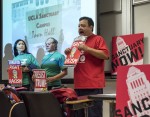As a queer student of color, UCLA is home. But while UCLA is already a sanctuary where I feel safe, this is not the case for every student.
Earlier this year, President DonaldTrump signed a series of executive orders on immigration that targeted undocumented immigrants and majority-Muslim countries, causing students nationwide to urge their campuses to declare sanctuary status. The designation has no legal definition, but is commonly considered an affirmation to not cooperate with U.S. Immigration and Customs Enforcement officials unless presented with a warrant.
While the University of California has made statements reaffirming its support for students affected by the executive orders, it has avoided using the term “sanctuary campus” due to its vagueness. It’s well-meaning, but attempts to put a Band-Aid over the problem by simply providing a list of services.
“Sanctuary campus” is not just a label. It’s a term encompassing a series of efforts to protect not only undocumented students, but all other marginalized communities – LGBTQ individuals, people of color, victims of sexual assault and others who have not traditionally had their needs represented.
The UC should use their commitment to marginalized students to redefine sanctuary-campus systems by including ally training for staff and faculty and a centralized list of resources online.
The nationwide push for sanctuary campuses and UCLA’s reputation as a flagship public university give it the opportunity and responsibility to set precedents for other campuses.And Bruins from several campus organizations have already united and laid out their vision for a sanctuary campus at a town hall last month.
“We don’t just want emails saying (the administration is) in solidarity with us,” said Dana Carrera, a third-year sociology and Chicana/o studies student who was one of the primary coordinators of the town hall.”We want tangible policy that has material impact because many of the executive orders have had impacts on Bruins and their families.”
UCLAstaff and faculty can protect vulnerable Bruins through ally training. Allies are members of a dominant or majority group who advocate for racial, religious or ethnic minority groups. The training will provide allies with necessary tools to address challenges faced by minority groups. Allies are not meant to act as counselors, but play a pertinent role in influencing the dominant culture’s support for a minority group and make it easier for students to navigate various resources.
They would appreciate the help. Alberto Moreno, a fourth-year Spanish and community and culture student who has collaborated with the UCLA Undocumented Student Program, recalled that USP was overwhelmed after the presidential election.
“Students won’t be wearing a label stating ‘I am undocumented,’ so it’s important for all staff and faculty to know the policies, resources and rights of students,” Moreno said.
Ally training should be relatively easy to implement because UCLA already conducts yearly campus climate surveys to assess the needs of students. UCLA’s 2014 campus climate survey revealed 24 percent of respondents reported being affected by exclusionary or hostile conduct. Many of them were ethnic and racial minorities.
Additionally, these programs can also prepare staff in case of ICE raids targeted at nonviolent offenders.
Most importantly, training should expose staff and students to services available to students via an online, centralized master list of resources. This list could reduce confusion involved in navigating UCLA’s extensive services, and provide exposure to less known resources such as the nondenominational prayer room in Ackerman.
Of course, this is not just a laundry list to check off. These suggestions are only a starting point for a series of continual efforts to make UCLA – whether labeled sanctuary or not – a space for all members of the UCLA community to unite; share their differences, contributions and successes; and join together to fight for equality regardless of their marginalized status.
These efforts are preceded by other prestigious campuses. Duke University has implemented mandatory ally training for faculty who wish to put safe zone stickers on their doors, identifying themselves as allies. Such training prevented staff from only showing support because it is politically correct, without the knowledge and skills to address the real issues some of their students face. Furthermore, the training also positively influenced student comfort and social support, which correlates with higher student performance according to a University of Chicago Consortium of School Research study.
Some opponents of sanctuary campuses have expressed concerns over losing federal funding; however, Trump can only reduce a state’s grant money, and the state ultimately decides how the money is distributed. California has been passing bills such as SB 54, which prohibits local police from detaining someone solely for immigration purposes, that mirror UCLA students’ demands for sanctuary campuses and demonstrate California’s support for sanctuary campus policies.
It’s a privilege of a lifetime to unapologetically be who you truly are. UCLA has granted me that opportunity and I’m forever grateful. It is only fair that UCLA provides the same dedication to all its students.
Muslim students should be able to pray without fearing for their safety. Undocumented students should be able to apply for financial aid and work permits without fear of deportation. All students have earned the right to call UCLA home.

In every Country in the world, you must sign the guest list on the way in and be able to provide verifiable documentation. Do you want to change this for the rest of the world or just the USA?